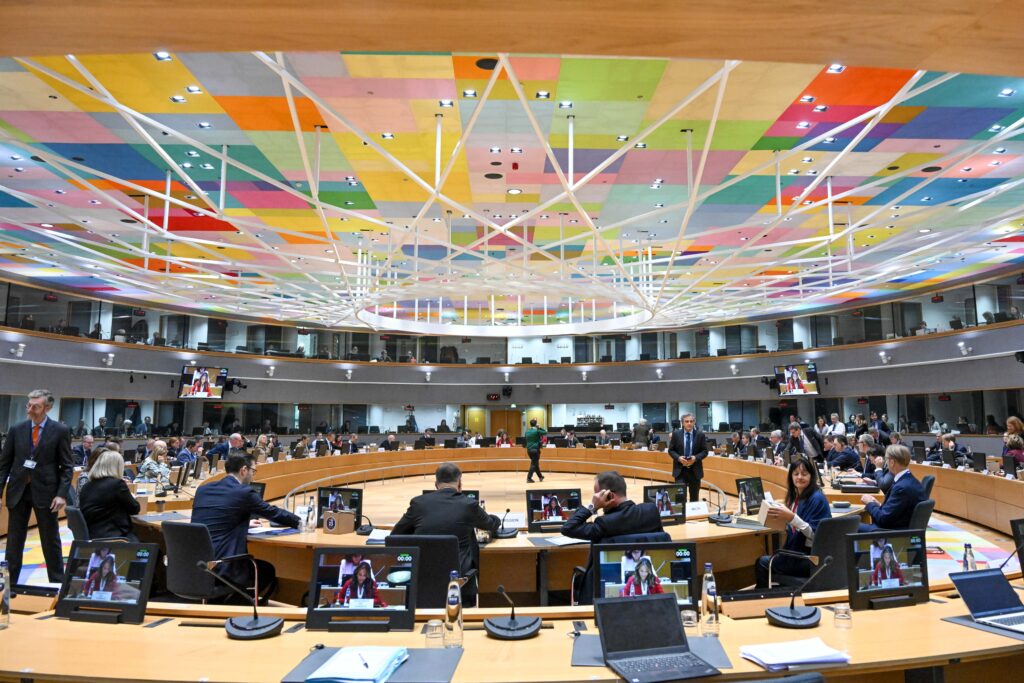Much ink is being spilled on predictions of ‘deglobalisation’ and restructuring of supply chains, but frenzied commentary over trends such as ‘re-shoring’ and ‘near-shoring’ tends to obscure the reality that trade flows have always been fluid and that global trade is back to pre-pandemic levels.
Global trade recovery remains fragile. Geopolitical tensions, spillover from regional conflicts, rising populism and protectionist policies are putting unprecedented pressure on globalisation.
The prospect of a complete breakdown in relations between the United States and China adds weight to any pessimism. Each day brings further threat — or the reality — of unilateral trade measures. While legitimate concerns may undergird these measures, such as climate considerations, the net effect is chipping away at governments’ faith in the global rules-based trading system. This is creating a vicious cycle of more barriers and more protectionism.
Global business priorities have not shifted since the WTO was founded 30 years ago. Cohesive, multilaterally agreed rules for international trade that provide certainty and predictability remain a fundamental demand from traders around the world.
The WTO, despite its flaws, has proven to be the single cohesive vehicle able to attract multilateral participation — from countries across the world at every stage of development — to address global trade challenges. The need for such an institution has grown with time. For example, effective multilateral dialogue at the WTO level is required to resolve the unintended consequences of novel environmental legislation, such as the EU’s carbon border adjustment mechanism and new rules on deforestation, particularly as they affect small businesses in developing countries.
Against growing threats to the system, the urgency of reforming the WTO grows each day. Its rulebook must be updated to meet the challenges and opportunities of the 21st century — its rules enforced and its agreements effectively monitored. Reform must be tackled consistently with an eye towards lowering trade barriers and upholding current commitments. And this must be done in cooperation with the private sector.
The alternative to holistic reform is almost too awful to contemplate. An April 2024 an International Chamber of Commerce (ICC)-commissioned study found that WTO dissolution would have dire consequences for developing economies, decimating their exports by 33 per cent and lowering GDP by 5.1 per cent by 2030.
In that scenario, the trade-led convergence that has enabled developing countries to grow their economies would disappear. This would also hit producers in advanced economies by reducing supplier access, exposing developed countries to increasing volatility and higher consumer prices.
Countries that do not enjoy elevated levels of integration into global supply chains would be further disadvantaged by any erosion of the multilateral trading system. Given the catalytic role of trade in job creation, the implications for global poverty reduction perspective would be profound.
In this age of digital innovation, the world has never been technically better placed to conduct trade more efficiently. Technology underpins all modern supply chains, including the internet of things, big data, machine learning and artificial intelligence. This shift to digital technology calls for the movement of data and information across borders, with all stakeholders depending on seamless and uninterrupted information flows across companies and countries.
To secure supply chain resilience and efficiency, governments must promote policy coherence and harmonised digital rules, increasing the urgency for robust WTO action. As a start, an agreement containing disciplines that will address digital trade barriers and facilitate digital trade must be reached and implemented at the WTO.
Work is already going into accelerating the development of a globally harmonised, digitalised trade environment. The ICC Digital Standards Initiative is engaging the public sector to progress regulatory and institutional reform, and mobilising the private sector on standards harmonisation, adoption and capacity building.
Trade facilitation remains key to functioning supply chains. Delays at borders hinder cross-border trade at every level, both regional and international. Full implementation of the 2017 WTO Trade Facilitation Agreement — which has already increased trade by over US$230 billion — is more relevant than ever.
Low and middle-income countries have come a long way in fulfilling their trade facilitation agreement commitments, but many still require assistance to finish the job. A failure to connect developing economies to global markets threatens to cut them further adrift, stifling economic opportunity and reversing previous gains. Likewise, lack of implementation undermines supply chain optimisation in these countries, hindering competitiveness.
To support low and middle-income countries in this endeavour, the ICC co-leads the Global Alliance for Trade Facilitation with the World Economic Forum and the Center for International Private Enterprise. With the support of the governments of the United States, Germany and Canada, this entity uses the trade facilitation agreement to address obstacles to trade in an inclusive, sustainable way through public–private partnership. The alliance approach to meaningful trade facilitation initiatives involves buy-in and ongoing engagement from both government and business, from project inception through to post-completion, recognising a shared responsibility in promoting frictionless trade.
This spirit of public–private cooperation must be brought to bear against today’s drift away from agreement and adherence to international rules and regulations. The WTO remains the best conduit for multilateral trade cooperation and future initiatives hinge on its reform and strengthening. Business as the real engine of economic growth and innovation needs to be engaged as a genuine partner — one that delivers on the concept of multi-stakeholder cooperation.
John WH Denton AO is Secretary General of the International Chamber of Commerce (ICC), Paris.


Leave a Reply